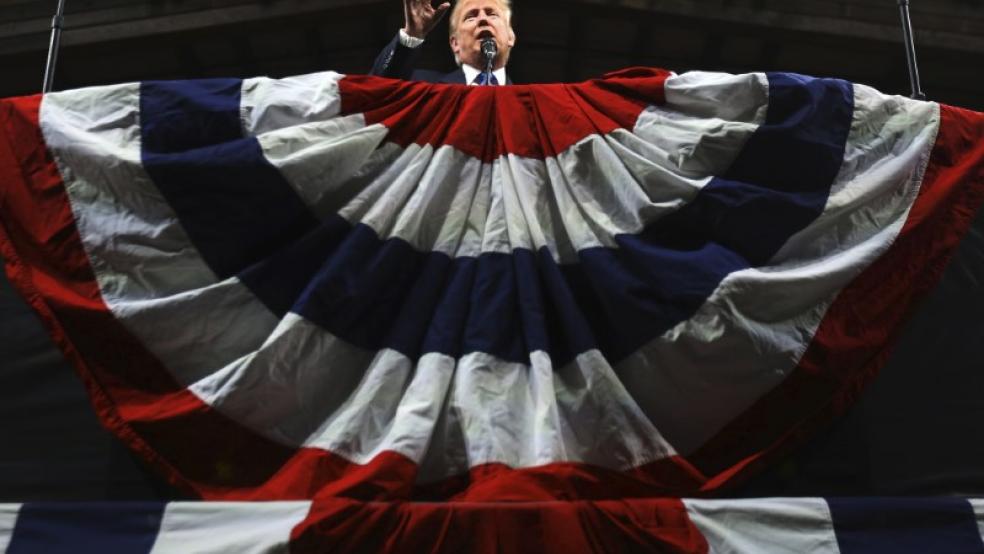Some days, it wouldn’t seem surprising if Donald Trump got up on stage and revealed that he is actually a deep-cover mole, working for the Democrats to destroy the Republican Party from within. Because if he were, his attack Tuesday on globalization and international trade would have been perfectly calibrated to do just that.
In his speech, Trump ran roughshod over three decades of Republican orthodoxy on the issue of free trade, prompting harsh rebukes from traditionally Republican-friendly groups, like the US Chamber of Commerce and the National Association of Manufacturers.
Related: Trump Denounces Globalization, but Trade Experts Aren’t Buying It
Trump also put Republican lawmakers in tough election battles in extremely uncomfortable positions.
In a year when the GOP is locked in a desperate fight to retain control of the United States Senate, he did it in two states where pro-trade Republican senators are facing very tough reelection battles.
Trump began the afternoon in Pennsylvania, the home of embattled first-term Republican Sen. Pat Toomey, where, sticking fairly closely to prepared remarks, he said trade deals have destroyed the American middle class.
Later in the day, though, he crossed the border into Ohio, home state of another first-termer, Sen. Rob Portman, who is facing a strong challenge from former congressman and governor Ted Strickland. In Ohio, Trump was a bit more colorful, underlining the difference between on-script Trump and off-script Trump. “The Trans-Pacific Partnership is another disaster done and pushed by special interests who want to rape our country,” he said. “Just a continuing rape of our country.”
Related: Pushed Around and Left Out. The Frightening US Parallels to Brexit
Portman who may be uniquely vulnerable to attacks on trade deals because of his service as US Trade Representative under George W. Bush, moved quickly to shore up his pro-labor bona fides, appearing on a radio show in his home state and claiming partial credit for three major anti-dumping cases brought against foreign steel manufacturers.
Other Republicans expressed bafflement at the sight of a Republican presidential nominee moving to the left not just of his own party, but of the historic positions of presumptive Democratic nominee Hillary Clinton.
Jeff Flake of Arizona, who has been critical of Trump (and is not currently in a reelection battle) took to Twitter Wednesday to express the astonishment that many of his colleagues no doubt share.
The Republican nominee running well to the left of the Democrat on trade? Not a banner day for the GOP https://t.co/ec0MjbWe7m
— Jeff Flake (@JeffFlake) June 29, 2016
Meanwhile, traditional Republican allies were livid. National Association of Manufacturers president Jay Timmons went after Trump on Twitter, telling him, “you have it backwards.” He added, “.@realDonaldTrump should understand 40% of manufacturing jobs are related to exports. We need more exports-- not less.”
Related: Trump and Clinton Square Off On Saving Social Security
The US Chamber of Commerce released a critique of Trump’s position before his speech started, and also went after it on social media while he was delivering it.
In a blog post, “Contrary to rumor, the benefits of trade greatly outweigh the costs,” senior vice president for international policy John G. Murphy wrote, “In fact, trade has been a lifeline for many more workers in Pennsylvania and Ohio — especially in the wake of the recession.
“Not only does trade support more than 3.1 million jobs in the two states, it’s fueled the economic recovery. This is especially true of trade with America’s trade agreement partners, which purchase 49 percent and 60 percent of Keystone and Buckeye state exports, respectively.”
While Republican lawmakers and their allies may be unhappy with Trump, one thing they absolutely cannot do is claim that they couldn’t have seen this coming. Not only has Trump been railing against US international trade deals since he descended the golden escalator in Trump Tower to announce his candidacy last year, he’s been doing it for well over 20 years.
Related: How Britain Could Reverse Its Historic Brexit Vote
The Trump campaign on Wednesday emailed reporters a collection of news articles detailing Trump’s history of opposition to trade pacts, like the Clinton-era North American Free Trade Agreement, which he said Tuesday that he would demand be renegotiated.
As early as 1993, prior NAFTA’s being ratified, Buzzfeed found evidence that Trump had spoken out against the deal at a business conference in California. The Associated Press, in 1999, reported that Trump was still powerfully against the deal in 1999, writing, “Trump called the North American Free Trade Agreement a disaster and said leaders of other countries 'can't believe how easy it is to deal with the United States.' 'We are known as a bunch of saps,' he said. 'We need our best people to negotiate against the Japanese and the many other countries that are really giving it to us from every different way.’”
In some ways, in fact, Trump is a monster of the GOP’s own making when it comes to trade. The party is usually very supportive of trade deals, but in a hyper-partisan climate, during an election year in which the senate, the White House, and the ideological balance of the Supreme Court are all in play, Congressional Republicans were unwilling to give President Obama a victory on the Trans Pacific Partnership.
Once expected to receive a vote this summer, TPP came under withering criticism from GOP leaders generally supportive of trade deals in most other cases. That means both that the future of the deal is in question and that Republican Congressional leaders don’t have much of a leg to stand on when their party’s presumptive presidential nominee starts demagoguing it.





